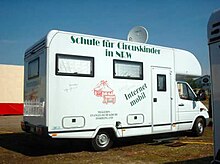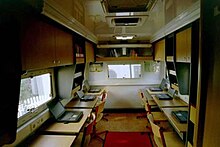School for circus children in NRW
| School for circus children in NRW | |
|---|---|

|
|
| School number | 192338 |
| founding | February 1, 1994 |
| address |
Gerresheimer Strasse 74 |
| place | Hilden |
| country | North Rhine-Westphalia |
| Country | Germany |
| Coordinates | 51 ° 10 '24 " N , 6 ° 55' 45" E |
| carrier | Evangelical Church in the Rhineland |
| student | approx. 200 |
| Teachers | approx. 30 |
| Website | www.schulefuercircuskinder-nrw.de |
The school for circus children in North Rhine-Westphalia (SfC) is a state-approved private substitute school for primary and secondary level I in all-day form based in Hilden. Its sponsor is the Evangelical Church in the Rhineland .
The basic aim of the SfC is to realize the right to schooling for children of traveling circus families. This is implemented in a school concept that takes into account the living conditions of professional travelers and enables continuous learning “on the go”.
history
The reason for the development of a school for circus children was the problematic conditions under which school attendance and learning by circus children took place or still take place today in large parts of Germany. Schools that change every week and with them changing teachers, classmates, teaching content and methods have the consequence that continuous teaching cannot take place and school failure is often inevitable.
In the 1980s, the Working Group for Social Education eV and the circus and showman pastoral care of the Evangelical Church in Germany began developing a school concept. In 1989, the NRW Ministry of Culture was convinced of the necessity of a school for circus children and the Evangelical Church in the Rhineland agreed to take over the sponsorship.
The SfC was founded on February 1, 1994 and began teaching in "rolling" classrooms on June 9, 1994. A school trial phase of eleven and a half years followed, after which the SfC was approved as an independent school as a substitute school in 2005 .
In 2014 the SfC celebrated its 20th anniversary in Monheim am Rhein. During the ceremony, the diplomas were handed over by the Minister for Schools and Further Education in North Rhine-Westphalia, Sylvia Löhrmann, and the President of the Evangelical Church in the Rhineland, Manfred Rekowski.
facts and figures
In addition to primary level and secondary level I , the SfC offers an early school entry class, as visiting a kindergarten is also very difficult on the trip. In this class, students up to the age of 5 can take part in lessons. The maximum age for attending the SfC is 21 years.
At the SfC, handicapped and non-handicapped pupils are taught jointly and all degrees of lower secondary level can be obtained.
In 2013, 113 students were taught on site by the SfC. A further 97 pupils took part in distance learning or were looked after during alternating school visits (base school visits). In total, the SfC taught and looked after 202 students from around 82 companies.
It started in 1994 with three teachers. In 2005 the college had grown to twelve teachers. In 2013 there were 32 full-time and part-time teachers working at the SfC (primary level teachers, secondary level teachers and special education teachers).
School and teaching organization
The educational offer of the SfC is aimed at children from circus companies mainly traveling in North Rhine-Westphalia.
On-site lessons
For on-site teaching, mobile teaching units and school units have been developed in which teaching takes place. They are driven by the school's teachers or pulled along by the circus. In addition, there are mobiles for specialized teaching, such as B. an internet and a technology mobile.
On-site lessons take place 2–3 days a week in learning groups of 3–6 students with different levels of ability and age. On the non-teaching days, the students work on individual learning packages. If the circuses are in one place for a long time in winter, the students attend the winter school. This is a regular school on the site of the winter quarters.
Tutorial
In the tutorial, the circus children who cannot be taught on site are looked after. For these children, the SfC takes on the function of the home school, i. In other words, in addition to keeping the student files, she is responsible for creating school diaries, certificates and syllabuses as well as providing learning material.
There are three types of tutorial:
- Distance learning: The students receive learning packages that they work through independently.
- Changing school attendance: The students continue to visit changing schools and are looked after and supported by the SfC.
- Private teacher on site: The SfC takes over the main school function for children whose circus employs a private teacher.
Online learning
In the course of the technical development and the expansion of mobile phone networks, the area of "Open Distance Learning" ( e-learning ) at the SfC was expanded in the 2000s and expanded with online courses. Both in distance learning and in on-site teaching, it allows for further learning opportunities, focus teaching and more frequent and more direct contact between teachers and learners. The latter are equipped with laptops and UMTS cards so that they can take part in online lessons.
A learning platform on the Internet (edunex) and a virtual classroom (Centra One), in which lessons take place in real time, are used. This includes preparation and follow-up of the lesson in close communication with the teacher via messenger program and email.
Learning concept
The focus at the SfC is on internally differentiated teaching and individual support, which are made possible primarily by small learning groups. Furthermore, due to the organization of the lessons, independence and self-reliant learning are central competencies that need to be imparted.
Learning is based on a modular principle, which offers the students not only compulsory modules but also optional modules and thus individual options and decision-making options. In particular, the modular principle allows pupils to be taught according to their individual learning status in the respective subject, regardless of their school class.
The school career is divided into four sections (tours) and ends with the final tour, which prepares for the 'central exams at the end of grade 10' (188 students have graduated from the SfC since 1998). The modules of the final tour take into account interdisciplinary learning as well as the concrete living conditions of the learners by orienting themselves on circus-specific content and topics important for future work in the circus.
swell
Education department of the Evangelical Church in the Rhineland (Regional Church Office): School for Circus Children in North Rhine-Westphalia of the Evangelical Church in the Rhineland Primary and Secondary Level I , 2001.



